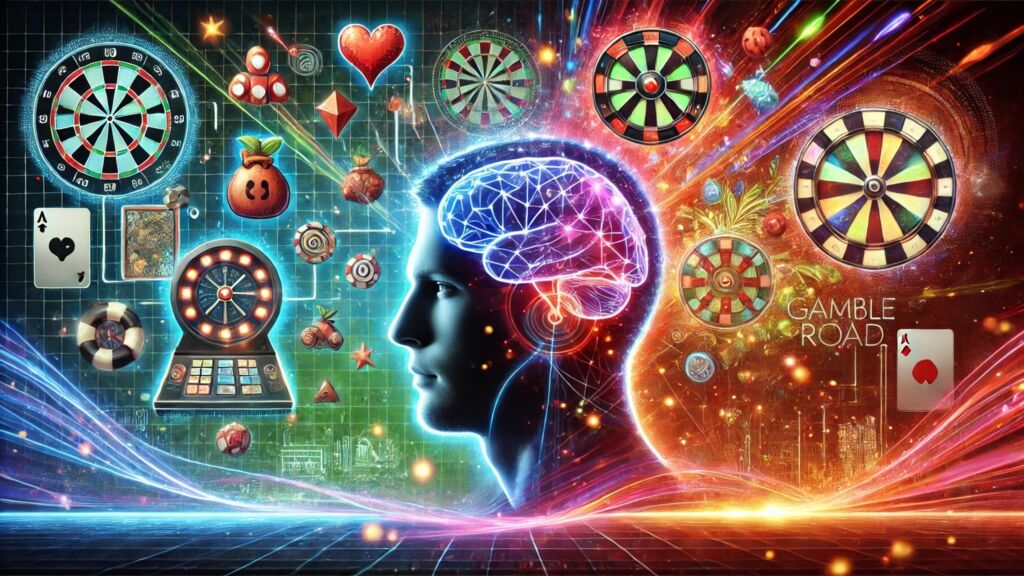While virtual casinos and platforms for sports bets have exploded in popularity by offering a wide range of gambling choices at one's fingertips with great convenience, they also pose a challenge: cognitive biases that can profoundly influence gaming behavior and financial health, particularly for those unaware of these inherent mental traps.
Dissecting the Influence of Cognitive Biases in Gambling Scenarios
Cognitive biases are psychological patterns that lead to deviations from objective reasoning in decision-making. These biases are especially relevant in the realm of online gambling where rapid decisions must often be made amidst uncertainty. This predisposition can result in irrational decisions, driven largely by emotion, which is a common state during gambling activities.
Recognizing these biases is crucial for both players and the platforms that host gambling activities. For the individuals who gamble, understanding these biases paves the way for healthier betting routines. Meanwhile, insights into player biases can help platforms encourage responsible gaming and curtail compulsive gambling.
Frequently Observed Cognitive Biases in Online Gambling
A range of cognitive biases can influence gambling decisions. Gaining awareness of these patterns is fundamental to reducing their adverse effects. Here are several common biases encountered in online gambling:
The Gambler’s Fallacy
The gambler’s fallacy is an erroneous belief that previous outcomes in random events can influence future outcomes. This manifests in online gambling as the assumption that a recent series of losses presages a coming win, or vice versa. For instance, a roulette player might mistakenly think that repeated appearances of red make black more likely next. This is misguided because each roulette spin is self-contained, uninfluenced by previous spins. This bias might drive players to escalate wagers to recover losses based on a nonexistent trend.
Imagine a scenario in online slots where a participant goes through 10 spins without notable success. They might wrongly sense an impending large payout, prompting them to bet more heavily. This increased wager is fueled by the gambler’s fallacy , ignoring that each turn maintains the same winning odds, regardless of past outcomes.
Loss Aversion
Loss aversion is where the anguish from a loss outweighs the satisfaction from a comparable gain. In gambling, this can lead participants to engage in riskier bets to evade losses rather than to accrue gains. Gamers facing losses might double their stakes, attempting an immediate recovery contrary to logic and statistical wisdom.
Think of a sports bettor who places a wager on a football match and promptly experiences a loss. Motivated by loss aversion , they might throw down an even bolder stake to swiftly recoup what they lost. This is not a calculated, rational decision but a reaction triggered by the emotional sting of losing, which can compound financial difficulties. According to a study in the *Journal of Gambling Studies*, loss aversion is a key indicator of problematic gambling behavior, as it prioritizes loss prevention over sound financial practices.
Availability Heuristic
The availability heuristic is a mental shortcut where people overvalue events that are readily brought to mind because they are vivid or notable. In internet gambling, advertisements and media often give prominence to big win stories or jackpot results, making them more memorable and skewing the perceived likelihood of winning, overshadowing the more common losses. The continuous bombardment of big win stories by online casino marketing influences perceptions of how often such wins occur.
Take the marketing strategies surrounding online lotteries, where ads spotlight images of brandishing large winnings. This capitalizes on the availability heuristic , leading potential players to mistakenly think lucrative victories are more prevalent and easier than they objectively are. The true, meager chance of a lottery win is overshadowed by these readily accessible, enticing pictures of triumph.
Overconfidence Bias
Overconfidence bias causes individuals to inflate their perceived abilities, knowledge, or prediction skills. In the context of online gambling, this could mean players believe they have devised a strategy to beat the house, even in games steered by chance. This bias commonly appears in games requiring skill, such as poker or blackjack, where people might overrate their prowess against both the house and other players.
Picture a poker player online who starts amassing small victories early. The overconfidence bias might swell their belief in their exceptionalism, causing them to engage in games with stakes exceeding their true ability. Ignoring statistics and ignoring advice about protective financial conduct, this excessive self-regard prompted by overconfidence can invite substantial financial loss.
Confirmation Bias
Confirmation bias is the inclination to focus on information that already aligns with one’s beliefs and to disregard contrary data. In the realm of online gambling, this could manifest in players highlighting win records while downplaying loss accounts. A gambler might center discussions only around narratives or data reinforcing their success while ignoring the harsh realities and inherent risks associated with casino games' winning margins.
Picture an online sports gambler who assumes they have a knack for forecasting basketball outcomes. While evaluating bets, they might lean heavily on evidence supporting their foresight, dismissing stats or insights contesting their viewpoint. This selective gathering of information driven by confirmation bias can sustain misguided betting routines, preventing honest reflection on wagers.
Illusion of Control
The illusion of control makes people believe they wield greater influence than they do over outcomes truly left to chance. In online gaming, particularly in slots with interactive components or live sports betting, gamblers may feel excessively in control. Features like manual 'skill stops' in slots, or decisions in bets done during games, amplify that illusion of influence when actually, randomness governs outcomes.
Consider a player enticed by online slots, which feature interactive elements like bonus games requiring the participant to make decisions. Despite the randomness governed by RNGs, making decisions can embed an illusion of control . The player might surmise their choices crucially impact results, when in fact, the decisions exert no real sway, misleading them into sustained play and growing bets.
How Online Gambling Settings Amplify Cognitive Biases
The digital platform of gambling intensifies these cognitive biases through various methods. Online gambling, being rapid and readily available, aids in making frequent bets, thus diminishing the time needed for contemplation and informed decision-making. The deliberately vibrant and stimulating design of online casinos cultivates an emotionally charged environment, which can hinder clear judgment.
Additionally, digital gambling environments often use tactics that subtly encourage these biases. For instance, near misses in slot games suggest the player is close to winning, thereby nurturing the gambler’s fallacy . Likewise, personalized offers fortify confirmation bias , rewarding players for involvement despite potential losses. The anonymity and solitude specific to online gambling further remove social checkpoints which otherwise might mitigate impulsivity and poor decision-making.
Approaches to Counteracting Cognitive Biases in Virtual Gambling
Recognizing and grasping these behavioral biases is a pivotal initial step for those involved in online gambling. Both gamblers and platform providers must collaborate in creating strategies to effectively address these biases, ensuring a responsible gambling experience.
For Individual Gamblers:
- Education and Awareness: Gain insights into prevalent behavioral biases and their impact on gambling choices. Being informed acts as a safeguard against making irrational decisions.
- Set Limits: Pre-determine financial and temporal restrictions before indulging in gambling activities. Select a spending cap and adhere to it regardless of outcomes. Utilize platform functionalities to enforce deposit, expenditure, and duration limitations.
- Take Breaks: Refrain from engaging in lengthy gambling sessions. Periodic breaks can rejuvenate your mindset and minimize impulsive actions influenced by biases. Disconnect from the screen, explore different tasks, and return with a clearer perspective.
- Reality Checks: Take advantage of the reality check tools provided by many online gambling platforms. These features offer routine alerts on time and money invested, aiding in maintaining an accurate perspective.
- Emotional Regulation: Stay conscious of your emotional feelings while gambling. Avoid engaging in gambling activities when under stress, distress, or extreme excitement since emotions can heighten biases. Practice techniques to keep a calm and balanced emotional state.
- Seek Feedback: Exchange views on your gambling activities with trustworthy friends or relatives. External insights can help uncover biased thoughts and unreasonable conduct that might be overlooked.
- Use Tools for Tracking: Document your gambling actions, noting time, finances, victories, and losses. This information provides an unprejudiced view of your gambling habits, helpful against confirmation bias and illusion of control .
For Online Gambling Platforms:
- Responsible Gambling Tools: Establish and advocate practical gambling measures like deposit caps, expenditure limits, session restrictions, self-exclusion choices, and reality verifications. Ensure these tools remain accessible and straightforward.
- Bias-Aware Design: Create platform user interfaces and game options that decrease the exploitation of behavioral biases . Avoid using deceptive design features such as frequent near misses or misleading jackpot visuals.
- Education and Information: Supply clear, easy-to-understand information about gambling risks and the effects of behavioral biases . Provide educational materials and links to support organizations promoting responsible gambling.
- Personalized Feedback: Deliver tailored insights to users based on their gambling behavior. For instance, offer stats on win/loss ratios, gambling duration, and spending habits to mitigate confirmation bias and illusion of control .
- Early Intervention Systems: Create systems to recognize early indicators of problematic gambling, such as frequent betting, chasing losses, and surpassing set boundaries. Initiate automated interventions via notifications or customized advice.
- Staff Training: Equip customer service personnel with the knowledge to detect problem gambling signs and offer suitable assistance and resources to players grappling with gambling-related difficulties.
- Transparency and Fair Practices: Maintain transparency in game rules, probabilities, and payout percentages. Refrain from employing misleading marketing tactics that exploit the availability heuristic and overconfidence bias .
Case Studies and Examples
To highlight the impact of behavioral biases , consider these scenarios and case studies:
Case Study 1: The “Lucky Streak” Myth (Gambler’s Fallacy). John, an online slots enthusiast, had a few small wins on a game. Caught in the gambler’s fallacy , he believed he was on a winning streak and increased his bets considerably, thinking the game was in his favor. However, each spin was independent due to the RNG, and he soon faced significant losses, quickly wiping out his earnings and a large part of his starting funds. His belief in a 'lucky streak' led to impulsive and financially harmful decisions.
Example 2: Chasing Losses in Sports Betting (Loss Aversion). Maria placed a bet on her preferred basketball team, who unfortunately lost. Reacting to the pain of loss due to loss aversion , she immediately placed a larger bet on another game to recover her losses. This reaction wasn't based on strategy but on an emotional urge to deny the initial loss. This pattern continued, resulting in increasingly risky bets and eventually, a substantial gambling debt, as she tried to undo her losses, a textbook example of loss aversion .
Case Study 3: Jackpot Advertising and Lottery Tickets (Availability Heuristic). Lottery platforms and online casinos often promote stories of big jackpot winners. These vivid narratives play on the availability heuristic , making people believe that hitting the jackpot is common. Sarah, influenced by such stories, started buying more lottery tickets online, misjudging her chances of winning because of the prominent images of winners, missing the true low probability of winning. The constant exposure to 'winning' stories skewed her perception, encouraging more participation.
Responsible Gambling's Prospects and Behavioral Science
The rise of behavioral science in responsible gambling initiatives marks a major advancement in tackling online gambling's challenges. Enhancing our understanding of behavioral biases will improve our ability to create better preventive and intervention strategies. Future approaches might include more customized responsible gambling tools, adjusted to individual player habits and biases. Technologies like artificial intelligence and machine learning could be pivotal in spotting and predicting risk-prone gambling behavior, facilitating timely interventions.
Furthermore, regulatory jurisdictions might increasingly leverage behavioral science insights to enforce design standards and advertising protocols that curb cognitive bias exploitation. The shift is moving towards crafting a gambling environment that balances entertainment with ethical responsibility, acknowledging and addressing players' psychological vulnerabilities.
Conclusion: Navigating the Online Gambling Landscape Awareness
Online gambling can provide entertainment and possible rewards but also presents considerable risks, magnified by behavioral biases . These influences, such as gambler’s fallacy , loss aversion , availability heuristic , overconfidence bias , confirmation bias , and illusion of control , can cloud judgment leading to poor gambling choices. For gamblers, understanding these biases is crucial for informed decision-making and maintaining control of their gambling activities. By setting boundaries, regularly taking breaks, and seeking feedback, individuals can lessen these biases' impact.
Online gambling companies must transcend entertainment delivery. Their responsibility includes prioritizing player welfare through responsible gambling measures, bias-conscious design, and continuous education. With collaborative efforts—individuals taking control and platforms adhering to ethical conduct—the online gambling space becomes safer and more manageable. Ultimately, understanding and curbing behavioral biases is vital for a balanced and enjoyable online gambling experience. More help and information on responsible gambling can be obtained from organizations devoted to promoting safe gambling practices. Always remember, when the fun stops, stop.
External Resources:



